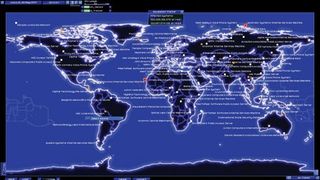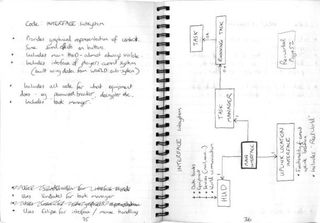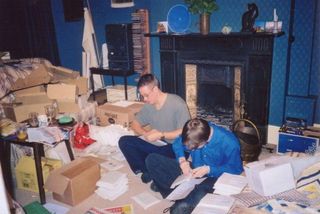
“I hit on the idea that it was going to be a piece of Total Fiction – capital T, capital F. The idea that it never admits to you that it's a game,” he says. It's easier to suspend your disbelief when there's no art and very little story to criticise, and eventually every extraneous idea was boiled away. “Uplink had become a rather silly cyberpunk romp, which wasn't what I intended. It can be hard to make decisions like this, but in the end I just hacked it all out – weeks of work spent writing the 'bioware' was simply torn out and thrown away. I think it was the right thing to do.”
Chris worked for 18 months before he shared his first build. “It can be very difficult to expose yourself to that kind of risk – when a close friend could demolish months of hard work and late nights with a couple of off-hand comments.”
Eventually, Chris's flatmates and future founders of Introversion, Mark Morris and Tom Arundel, got to see Uplink in action. The interface was brutally unforgiving, but it showed promise, and impressed them enough to invest.
Mark and Tom created a business proposal. “The gestation was that in Imperial College in the final year there was a business competition, and the premise was you had to write a business plan and submit it. So we wrote a business plan for Introversion before the company really existed.” The plan didn't place in the top three, but it was good.
“They estimated that we would need maybe £200 each to get the company off the ground – a tiny amount of money,” Chris says. So they did it. Introversion was formed on £600, and no more cash has ever been injected into the company aside from earnings from game sales.

“None of this would have happened if it wasn't for them; I would have given the game away probably. It would have been donationware – send me some money if you like it – and no one would have ever heard of it again. They were really, really fearless and really pushed it.”
The three friends spent £100 on legal fees to register Introversion. The other £500 was spent on printers and blue ink, so they could print the game's now iconic artwork. “We had no advertising budget to speak of, no money to pay for production, and no formal training in any relevant areas such as marketing or advertising. We didn't even have a proven game concept,” says Chris.
PC Gamer Newsletter
Sign up to get the best content of the week, and great gaming deals, as picked by the editors.
Fortunately, they had the smarts to send the game out to the press. One copy landed on a desk here at PC Gamer, where Kieron Gillen awarded it 80%. Uplink started to sell. Chris, Tom and Mark were burning the game to CDs, printing their own labels, and packing the parcels in their living room.
Uplink was Chris's creation, but it was Mark and Tom who pushed the game out to the world. “They were talking about doing a shop version,” says Chris, “What? Get it in the shops? Next to FIFA and Warcraft?” They managed exactly that, with a lesson in distribution from the manager of a local HMV.
“They went into HMV with a copy of the game and asked somebody behind the till 'Can we start selling our game in your shop please?', and they basically said 'What planet are you from?'. They stayed there and spoke to the manager of that HMV store. He told them that they would need a deal with a major distributor.”
The freshly-formed company picked UK game distributor Pinnacle Software to publish Uplink. And sure enough, HMV ordered a batch of 10,000. “We kind of did the shop deal in the same way as the game. It was all absolute first principles: start from nothing, then figure it out,” explains Chris.

Introversion was formed with a clear agenda – to make money – and it did that without any advertising. “So far, everything we've done with Uplink has happened because of word of mouth. It's a very simple principle: somebody likes the game, so he tells his friends.”
Chris reminisces about the moment when he realised the game had become a success in his essay, The Genesis of Uplink : “The moment when I knew Uplink had been a success was when I stepped into Tom's living room and saw the stacks of CDs that we'd ordered. Boxes and boxes of them, piled up to my waistline. As I sat down and admired the sight, Mark informed me that this was half the order, and that the other half were in the back of the garage.”
Chris had turned his old idea into a finished game, with help from three notebooks and two friends – but no marketing budget, no contacts and no experience. The money Uplink brought in allowed Introversion to start planning for the future, and Chris could start working on his next idea: Darwinia.]
Today, Introversion are working on a new game, Prison Architect, the paid alpha for which has already made it a success. But if you want to go back to that first idea, Uplink still stands up, as slick, tense and fun as ever
Most Popular

